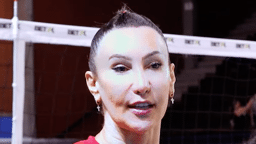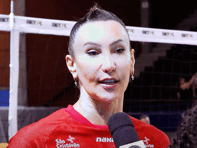 Several new ‘You Can Play’ videos have come out of Canada in the last week, and a couple have some interesting hooks (see all three below). The University of Ottawa’s athletic department (they’re called the Gee-Gees) teamed up to create a bilingual video in French and English. Ottawa borders the province of Quebec, which has a strong French-speaking population. From what I’ve seen, this is the first LGBT-support video from any sports group that is fully bilingual (others have had drops of Spanish here and there). Kudos to them!
Several new ‘You Can Play’ videos have come out of Canada in the last week, and a couple have some interesting hooks (see all three below). The University of Ottawa’s athletic department (they’re called the Gee-Gees) teamed up to create a bilingual video in French and English. Ottawa borders the province of Quebec, which has a strong French-speaking population. From what I’ve seen, this is the first LGBT-support video from any sports group that is fully bilingual (others have had drops of Spanish here and there). Kudos to them!
The Sault Ste Marie Greyhounds of the Ontario Hockey League (a top junior ice hockey league in Canada) also took a stand against homophobia with a video featuring their general manager and two players. It's so low-budget it's actually quite cute, and the fact that it is so rudimentary actually drives home the message. The reaction shots are hysterical; They're laughing through half the video. It's quite endearing.
 Several new ‘You Can Play’ videos have come out of Canada in the last week, and a couple have some interesting hooks (see all three below). The University of Ottawa’s athletic department (they’re called the Gee-Gees) teamed up to create a bilingual video in French and English. Ottawa borders the province of Quebec, which has a strong French-speaking population. From what I’ve seen, this is the first LGBT-support video from any sports group that is fully bilingual (others have had drops of Spanish here and there). Kudos to them!
Several new ‘You Can Play’ videos have come out of Canada in the last week, and a couple have some interesting hooks (see all three below). The University of Ottawa’s athletic department (they’re called the Gee-Gees) teamed up to create a bilingual video in French and English. Ottawa borders the province of Quebec, which has a strong French-speaking population. From what I’ve seen, this is the first LGBT-support video from any sports group that is fully bilingual (others have had drops of Spanish here and there). Kudos to them!
The Sault Ste Marie Greyhounds of the Ontario Hockey League (a top junior ice hockey league in Canada) also took a stand against homophobia with a video featuring their general manager and two players. It's so low-budget it's actually quite cute, and the fact that it is so rudimentary actually drives home the message. The reaction shots are hysterical; They're laughing through half the video. It's quite endearing.
Four broadcasters from TSN, which is Canada’s version of ESPN, teamed up to create a video saying they will not make sexual orientation a focus of their coverage.
We will evaluate you on your athletic abilities. We will not turn your sexual orientation into your defining characteristic.
It's an interesting choice. Certainly athletes want to be judged by their performance in games. However, reporters refusing to ask questions about sexual orientation is one of the main reasons there hasn't been more ground broken on this issue. It's a defense we hear thrown up from reporters all the time: "It shouldn't matter if someone's gay, so I'm not going to talk about it." Many athletes are ready and willing to talk about these issues, but the reporters won't ask the questions.
I appreciate the sentiment behind what they're trying to say. We hear that gay athletes might be afraid they'll be labeled "the gay athlete" after coming out (though, we never hear pro gay athletes say that – we just hear people speculate about that). Either way, guess what: They're right. For a time, anyway. Whether that player likes it or not, it will be and should be (from a journalist's perspective) the angle from which he's covered for days if not weeks after he comes out. At some point it stops being the story, and it's back to only sports stats and performance.
Again, I appreciate the sentiment: "We don't care if you're gay, we just want you out on the ice." They didn't have to make the video, but they did, and that's awesome! What they actually said, as both a journalist and a gay man, made me cringe just a bit.
Interestingly, I couldn't find the video anywhere on the TSN Web site. I searched the site and the video library: Nada.







































